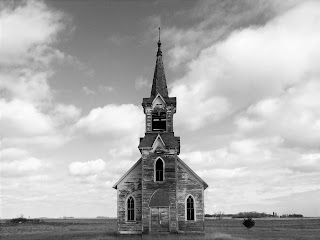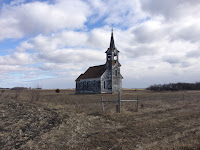 There is little doubt
that transition is occurring at the heart of Christianity. Decreasing
numbers of members and worshipers as well as a current discontent signal
that some sort of Christian transformation is occurring.[1] We can nearly all agree that
something is happening. Dr. Diana Butler-Bass says, “Indeed, the first decade
of the twenty-first century could brightly be called the great Religious
Recession.”[2] In 1990, the number of people who
claimed no religious affiliation was 8 percent. In 2008, the
number had grown to 15 percent and had spread from the northwest part of the
United States to the Northeast,[3] and the number of people who now consider
themselves only spiritual, non-religious or both religious and spiritual has
grown.[4]
There is little doubt
that transition is occurring at the heart of Christianity. Decreasing
numbers of members and worshipers as well as a current discontent signal
that some sort of Christian transformation is occurring.[1] We can nearly all agree that
something is happening. Dr. Diana Butler-Bass says, “Indeed, the first decade
of the twenty-first century could brightly be called the great Religious
Recession.”[2] In 1990, the number of people who
claimed no religious affiliation was 8 percent. In 2008, the
number had grown to 15 percent and had spread from the northwest part of the
United States to the Northeast,[3] and the number of people who now consider
themselves only spiritual, non-religious or both religious and spiritual has
grown.[4]
One great challenge in
the midst of religious transitions is naming exactly what is occurring. When
something is not named, it is more difficult to understand. Butler-Bass’ identification of re-traditioning[5] or
William McLouglin’s identification of the Fourth Great Awakening[6] has
provided my first glimpse of a naming to match my observations of church as a
religious professional. First and foremost, whatever change is
occurring, it is big! The current of change in religion,
spirituality and church has many nuances and means different things to
different people. The change is more permanent than a renewal of
some ideal of the past. The shift our culture’s understanding and
acceptance of religion and spirituality is new. I believe we are in
the midst of a great awakening. Butler-Bass quotes William McLouglin
when she observes that “Awakenings begin when old systems break down, in
‘periods of cultural distortion and grave personal stress, when we lost faith
in the legitimacy of our norms, the viability of our institutions, and the
authority of our leaders in church and state.”[7] This
definitely defines today’s Christian culture. This is us and this is
now!
Even though I believe we
are in the fourth (or possibly fifth) great awakening, I cannot quite put my
finger on where we are in the process. It seems as if this awakening
is taking a really long time. The past Great Awakenings in the
United States last about 30 years.[8] If
this Great Awakening has its roots in the early 1970’s then we are well into
the fourth decade. One might ask why this particular Great Awakening
is taking so long.
Eras of transition such
as a Great Awakenings are best labeled in hindsight. Maybe our culture is
so ingrained in the transition that we do not have
enough distance to identify it properly. We know what the beginning
looks like and can name many examples to demonstrate this
beginning. People are restless and sure of only the fact that
the usual ways of doing church are not working for them. But it is
hard to surmise if we are in the middle or the end. Is the Great
Awakening almost complete or does our society have a long way to go?
Over the next few blogs, I will explore this look at larger religious and spiritual shifts in today's global church. I will argue that it is possible that the shift we are encountering is greater than an Awakening. Even though this particular blog names Christianity, I believe these shifts can be seen in many (if not most) religions of the world.
What do you see? What larger religious and spiritual shifts are apparent to you?
Please feel free to comment! The conversation makes this a collaboration and therefore, a richer conversation.
Over the next few blogs, I will explore this look at larger religious and spiritual shifts in today's global church. I will argue that it is possible that the shift we are encountering is greater than an Awakening. Even though this particular blog names Christianity, I believe these shifts can be seen in many (if not most) religions of the world.
What do you see? What larger religious and spiritual shifts are apparent to you?
Please feel free to comment! The conversation makes this a collaboration and therefore, a richer conversation.
Works
Cited
Butler-Bass, Diana. Christianity
After Religion: The End of Church and the Birth of a
New Spiritual Awakening. New York: HarperCollins
Publishers Inc., 2012.


McLoughlin, William G. Revivals, Awakenings, and Reform: An Essay on Religion and Social Change in America, 1607-1977. Chicago: U of Chicago, 1978.
[1] See Butler-Bass, Diana. Christianity
After Religion: The End of Church and the Birth of a New Spiritual
Awakening. (New York: HarperCollins Publishers Inc.,
2012). Chapter one outlines research in decreasing membership and
discontent. To see 2015 Pew Research on the subject, go to http://www.pewforum.org/2015/05/12/americas-changing-religious-landscape/. To
see the rollercoaster of membership numbers in the author’s own Unitarian
Universalist tradition, go to membership
http://www.uua.org/directory/data/demographics/uua-statistics.
[5] Tickle, Phyllis, The Great
Emergence: How Christianity Is Changing and Why. (Grand
Rapids, MI: BakerBooks, 2008), Kindle Edition. Tickle
refers to Butler-Bass’s work drawn from Alban Institute Articles.

I have to take some time to really articulate this, but in broad strokes, I believe that what is happening is more than a Great Awakening (although it does resemble one in many ways). I think that there is schism afoot across denominations. It's creating some refreshing disruption and I'm excited to see 1)what will come of it and 2) how religious leaders can be on the leading edge.
ReplyDeleteI believe you are correct about a schism. A good discussion point. I wonder if the schism is a separate entity or a reaction to another greater shift. I also agree that it will be exciting to see what comes of it. What are your ideas on how religious leaders can be on the leading edge? In the midst of the shifts is a shift in the role of leadership - it can be uneasy - but it can also be empowering!
ReplyDelete